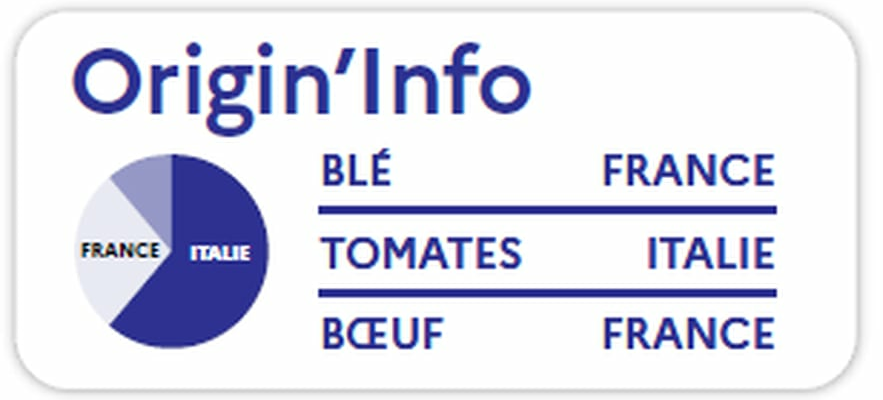These are “80 brands” which are committed to “better transparency on the origin of processed food products”, welcomes Olivia Grégoire on X (ex-Twitter), this Saturday May 25. The Minister Delegate in charge of Business, Tourism and Consumption had revealed the day before In The Parisian the concept and design of Origin’Info, a new logo for processed food products, which should allow consumers to know the origin of their ingredients.
“This initiative is the meaning of History,” considers Ms. Grégoire in The Parisian, because “for more than 80% of consumers”, the “salient elements which determine the act of purchase” are “the price and the geographical origin of the product”. The initiative also responds “to the expectations expressed by the agricultural sectors, which expect more transparency from food processing companies in addition to already existing regulatory obligations”, believes in a press release the Minister of Agriculture, Marc Fesneau.
What does this logo consist of?
Blue or black, very neutral, it can be affixed directly to the packaging, and will mention the three main agricultural materials of the product and their countries of origin. On an illustrative photo representing a Bolognese pasta dish, we read “Wheat France”, “Tomatoes Italy” and “Beef France”.
Example of Origin’Info logo design
© / Ministry of Economy
The logo may be supplemented by a mention of the place of processing of the product – which is particularly important to the French food SMEs and mid-sized companies united in Pact’Alim -, and by a graphic symbolizing the share of each country in the composition.
Manufacturers can dematerialize the information with a QR Code on the product. Origin’Info information may also appear on electronic labels on shelves and on brand drive-thru sites.
When and how should it be implemented?
“The deployment of the Origin’Info display will be gradual from this summer: it may concern, by the end of the year, more than 10,000 references,” specifies the ministry on its site.
80 companies have already signed the Origin’Info charter, announces Bercy. Among them, Fleury Michon, Bonduelle, D’Aucy, Lesieur, Panzani or Saint-Mamet, and most of the major distributors, Auchan having signed but not launching until 2025. This charter, available on the ministry’s website, ” is complex”, admitted in The Parisian David Garbous, president and co-founder of the En vérité association, which campaigns for maximum transparency in food companies. “But we are happy that Origin’Info is seeing the light of day,” he continued.
The Origin’Info system will only be carried out on a voluntary basis, to remain within the framework of European law. The Minister of Agriculture, Marc Fesneau, urged companies to “join massively in this collective approach”.
How was the measure received?
The consumer defense associations Rural Families, Foodwatch and UFC-Que Choisir, welcomed “the approach in favor of more transparency”, but regretted that it must be voluntary. “Brands with a sourcing policy with multiple, variable or distant origins will not be encouraged to demonstrate more transparency,” they observe. in a joint press release.
The associations also contest the possibility for manufacturers to dematerialize information with a QR Code on the product, forcing the buyer to open it with their phone, while in addition “nearly a quarter do not have a smartphone” , recalls Olivier Andrault. This is so that the company does not have to “regularly modify the packaging” if the ingredients change their origin depending on the seasons, like strawberries in yogurts or tomatoes in tomato sauce, explains the minister in The Parisian.
For CLVC (Consumption, Housing, Living Environment), Origin’Info “must not overshadow the deployment of the Nutri-Score” which concerns the nutritional quality of products. CLVC fears that “some brands only display the logo that is advantageous to them”.
Pact’Alim welcomes this new “voluntary system”, however wishing to be able to evaluate it in a year, particularly in terms of cost. Finally, both Pact’Alim and consumer defense associations urge Ms. Grégoire to bring to the European level the obligation to adopt a measure like Origin’Info from 2025.
.
